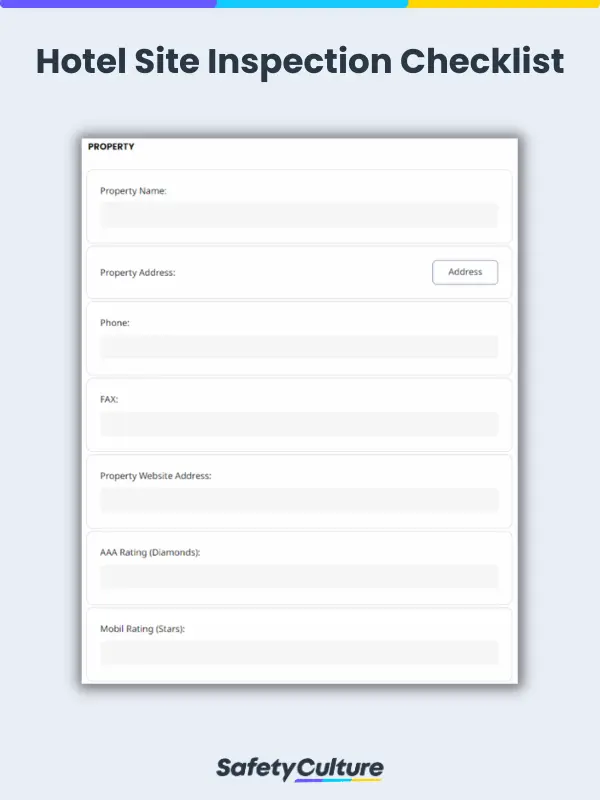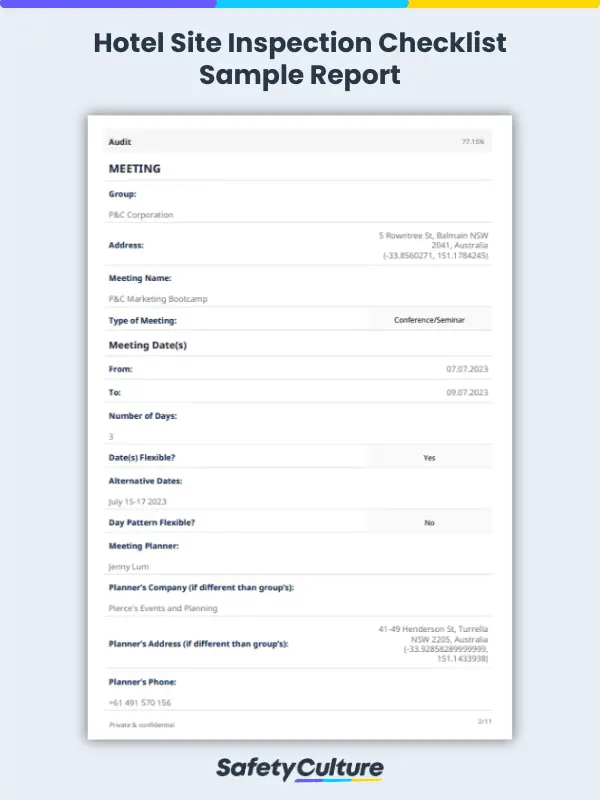What is a Hotel Site Inspection Checklist?
A hotel site inspection checklist is a tool used to thoroughly assess a hotel or a site to determine if it is ideal for an event. Also called a hotel inspection checklist, it serves as a guide for event planners when considering the advantages, limitations, and minute details of a site before deciding if it is going to be the perfect venue for an event.
What is included in a Hotel Site Inspection?
Basic Details
Starting with the basics, event planners gather basic information about the event itself, including the date, time, duration, and estimated number of attendees. They also establish contact with the event planners or coordinator to facilitate seamless communication throughout the planning process.
Hotel Property
Next, the focus shifts to the hotel property. This involves scrutinizing various facets, such as accommodation options, property layout, transportation accessibility, room specifications, and available amenities. The quality and condition of these amenities play a significant role in rating the property for the event.
Additionally, planners examine the pricing per night for different room types, including single, double, and suite options. The condition and suitability of the furniture and equipment provided by the hotel for the event are also thoroughly assessed.
Food and Beverage
Food and beverage is another important consideration, involving a detailed examination of menu options, pricing, and any special dietary requirements.
Summary of Estimated Expenses
All the information gathered during the hotel site inspection is properly compiled to create an overall estimate of expenses. This comprehensive overview ensures that the event remains within budget while maintaining the highest standards in every aspect, from accommodations and amenities to dining and event services.
How to Conduct a Hotel Site Inspection
To conduct a hotel site inspection effectively, start by assessing the venue and nature of the event to determine if it aligns with your requirements and vision. Consider factors like the event size, layout, and ambiance to ensure it meets your needs. This systematic approach will help you make an informed decision and ensure the chosen hotel aligns with your event’s objectives.
For an ideal hotel inspection when preparing for an event, consider following these steps:
- Examine the Venue: Begin your inspection by examining the overall condition and aesthetics of the venue. Ensure that it aligns with the theme or style of your event.
- Consider the Layout: Visualize how the event space can be configured to accommodate your guests comfortably. Look for any potential obstacles or limitations.
- Evaluate Lighting and Ambiance: Evaluate the lighting options available in the event space. Consider whether they can be adjusted to create the desired ambiance.
- Test the Acoustics: For events with audio requirements, check the acoustics of the space. Ensure that sound can be properly managed.
- Check the Outdoor Areas: If your event includes outdoor components, inspect those areas as well. Consider weather contingencies and backup plans.
- Evaluate Event Spaces: Different hotels offer various event spaces. Assess the available options and their suitability for your event. Common event spaces may include ballrooms, meeting rooms, outdoor terraces, or gardens. Ensure they meet your size and layout requirements.
- Consider Technical Requirements: For conferences, presentations, or performances, technical infrastructure is crucial. Check if the venue provides audiovisual equipment, high-speed internet access, and technical support. If not, evaluate whether you can bring in external vendors.
- Gauge the Hotel’s Services and Amenities: The services and amenities offered by the hotel can greatly impact your event’s success. Evaluate the quality of catering, room accommodations, and customer service. Inquire about any special packages or promotions for events.
- Analyze Budget and Cost Factors: Maintaining your budget is vital during event planning. Gather detailed pricing information, including venue rental fees, catering costs, and any additional expenses. Be prepared to negotiate and ensure transparency in pricing.
- Review Accessibility and Location: Consider the accessibility of the hotel for your guests. Is it easily reachable by various modes of transportation? Assess parking options and accessibility for individuals with special needs.
- Pay Attention to Event Contract Terms: Before finalizing your decision, thoroughly review the event contract. Pay attention to cancellation policies, payment schedules, and any additional terms and conditions. Seek legal advice if necessary.
- Document Your Findings: During each site visit, take detailed notes and photographs to document your findings. This will help you recall the specifics of each venue when it’s time to make a decision.
Things to consider when choosing a venue for your next event or conference:
- Is the hotel available on your preferred date?
- Will your budget be sufficient for the location you desire?
- Is the hotel location accessible enough for your attendees?
- What other groups/companies are holding their own meetings/events at the hotel during your scheduled event?
- What are the amenities?
- Is there a scheduled refurbishment/renovation work during the time of booking? How will this impact your event?
If you are considering more than one venue, it is best to schedule your site inspection appointments as close together as possible, so you can compare the venues better.
Tips for reviewing hotels/venues for your next conference or event:
- Be the guest
Putting yourself in the shoes of your guests will help you make a better judgment. Think like your attendees. This means you have to experience what the attendees will be experiencing if you hold the event in that particular hotel. Pay attention to details as you arrive at the hotel, during the site inspection, and as you are leaving. Check the hotel map, sample the food, walk the halls, sit in the lobby, get a feel of the venue. - Organize your visit
List the people you have to meet during your visit (sales manager, office manager, head of housekeeping, the chef, convention services manager, etc.). How much time do you need to spend during the inspection? What are your priorities for the inspection? Schedule your site visit in advance to make sure that the persons you need to meet are available. You may seek the assistance of a Destination Marketing Organization (DMO), which is also known as Convention Visitors Bureau (CVB) if you are considering several hotels. - Don’t forget to document everything
With so much information that you need to check during the inspection, make sure you do not miss anything. Take as many photos and videos as possible. - Do your research
Check for reviews and feedback from previous guests. Find out about any challenges other guests experienced during their stay. Ask about their experiences, whether good or bad. Ask for recommendations. However, remember that online reviews are not enough. A physical site inspection is still the best way to check the venue before making a decision. - Be clear about the objectives of your site inspection
You will ask the right questions when you know what you’re looking for. Don’t ask questions that can easily be answered by looking at the hotel’s website. Do they have enough guest rooms for everyone? What are their group rates? Are the rates reasonable? Check the hotel’s cleanliness, how the staff treat guests, the hotel’s flexibility with the needs of the event/conference you are organizing, safety and security, hidden charges and other fees. - Give attention to details
From the public areas, the guest rooms, kitchen, restrooms, to the actual meeting room and lobby – carefully observe everything going on around you. The condition and size of the actual venue/meeting room are some of the most important things to check during your visit. Is it clean? How’s the air-conditioning and lighting facilities? Do they have enough facilities for your event’s needs? What about sound-proofing? How’s the Wi-Fi service? Is the AV equipment working? What are their drink packages? How many serving staff will assist you during the actual event? Sample the meals they serve. Meet with the chef so you can ask about food sanitation and how they cater to requests for Halal, Kosher, vegetarian, etc. If the event requires overnight accommodation, check the room locations, room service, sanitation, furniture, safety and security and other considerations. Don’t forget to check the lounges or bar areas of the hotel too. - Use a good hotel site inspection checklist
A hotel site inspection checklist can serve as a guide on evaluating hotels and venues. Using a checklist can help planners keep track of the details needed to make a decision. Ensure that checklists checks off the following crucial areas:- Security – Do they have surveillance cameras set up? What protocols do they have for lost or stolen hotel keys? Are room locks in place to protect guests?
- Safety – Do they have fire safety protocols in place? Are operational equipment regularly maintained and up to code?
- Quality – How is the hotel’s level of service?
- Housekeeping – How is housekeeping maintained for the rooms? How often does housekeeping conduct room checks?
Frequently Asked Questions (FAQs)
Hotel site inspections can be conducted by the following people:
- Hotel owners: ensuring compliance with standards
- Architects: overseeing construction or renovations
- Real estate investors: assessing investment potential
- Event planners: assessing suitability for gatherings
- Travel agents: gauging accommodations for clients
- Prospective guests: researching for stays
The duration of a hotel site inspection can vary widely, typically ranging from 30 minutes for a brief walkthrough to several hours or even a full day for a comprehensive in-depth evaluation. The length of the inspection depends on factors such as the purpose of the visit, the size and complexity of the property, and whether it’s a one-time assessment or part of an ongoing quality assurance process.
Certainly! This checklist is customizable to fit your needs and ensure a complete audit trail. Have the freedom to generate unique QR codes for each template and place them within process documents.




